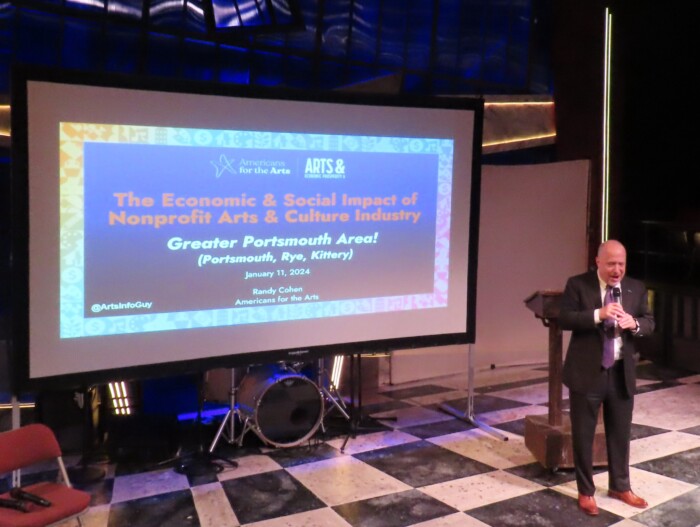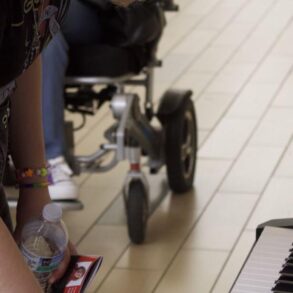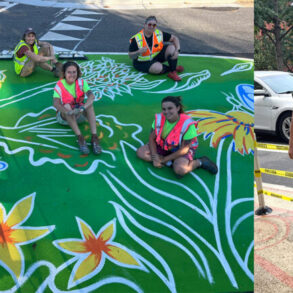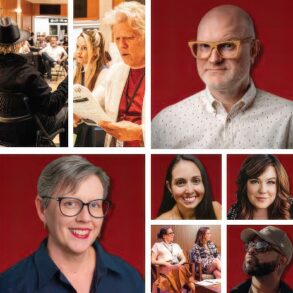
Randy Cohen, vice president of research with Americans for the Arts, visited Portsmouth on Jan. 11 to discuss the impact of arts and culture on local, state and national economies. (Photo by Paul Briand)
Arts and culture are growing contributors to the New Hampshire economy, and that impact is seen locally, with arts/culture in the Seacoast region contributing $70.2 million in spending in 2022, according to a new study.
Randy Cohen, vice president of research with Americans for the Arts, visited Portsmouth on Jan. 11, armed with new data on how the arts and culture contribute economically to the Seacoast region, to the state of New Hampshire and to the country as a whole.
Americans for the Arts, based in Washington D.C. since 1960, is an advocacy organization, and it publishes studies every five years or so that assess how nonprofit arts and culture organizations help drive the economic engine.
According to the new Arts & Economy Prosperity 6 study, arts/culture in the Seacoast region of Portsmouth, New Castle and Rye, NH, along with Kittery, Maine, put $70.2 million into the local economy. Of that total, $29.1 million was spent by the organizations, while $41.1 million was spent by audience members.
Cohen described arts/culture as an industry that has an economic effect beyond what’s paid to performers, musicians, writers, graphic artists and the like. It has an effect on the guy in the parking garage the night of the show, the cooks, waiters and staff at the restaurant where you get a meal beforehand, the work that went into the e-commerce site to buy the tickets beforehand and so on.
“All of those kinds of jobs are supported,” said Cohen, during his presentation at the Seacoast Repertory Theatre, organized by the Chamber Collaborative of Greater Portsmouth. “Bottom line: The arts are not just food for the soul, but putting food on the table for 1,250 households in this region. And one other thing, these are very local jobs. This is not the kind of industry that’s going to offshore those jobs.”
On average, according to Cohen, each audience member spent $48.45 at an event to include everything from food and drink to lodging to babysitting.
“If you’re a local business, you love the arts. You love this vibrant arts community which everybody here understands,” he said, “because that’s providing vital revenue to you, the pockets of local merchants. It’s good for local businesses — heads in beds, cheeks in seats, derrieres in cafe chairs. That does all of that.”
According to Cohen’s data, that $48.45 spent by each audience member is more than the national average, which is $38.46 per event.
Nationally, the arts contributed $151.7 billion into the economy.
The local part of the survey was conducted in 2022 by arts and culture organizations in Portsmouth, Rye, New Castle, NH, and Kittery, Maine. The study was funded by the city of Portsmouth and coordinated by the Portsmouth Arts & Nonprofits Committee.
The last study, AEP5, covered 2015. At that time, the local contribution to the economy was $58 million — $21.5 million by the organizations and $36.5 million by audience members.
The growth from 2015 to 2022 of economic impact is 10%.
Citing statewide statistics, as compiled by U.S. Bureau of Economic Analysis, Cohen said in 2021 arts/culture was responsible for $3.3 billion and 21,531 jobs in the Granite State. That federal analysis included not only nonprofits but also any commercial entities related to arts, culture and entertainment.
In a separate statement on the statewide effect, Arts4NH noted arts and culture were 3.3% of the state’s gross state product (GSP) in 2021, and contributed more to the state’s economy than construction ($2,971,300,000), education services ($2,195,700,000), utilities ($1,476,300,000) and more. “We’re even bigger than the state’s outdoor recreation economy ($2,663,745), which was 2.7% of the state’s GSP in 2021,” the advocacy organization said.
The statewide effect of arts/culture has grown steadily in recent years — from $3 billion in 2018, to $3.1 billion in 2019, $2.9 billion in pandemic-affected 2020, to $3.3 billion in 2021, the most current year available from the U.S. Bureau of Economic Analysis.
As part of a panel discussion after Cohen’s presentation, local restaurateur Jay McSherry talked about the effect arts/culture has on his restaurants. “It all helps. It’s a high tide that raises all boats,” he said.
McSherry heads the McSherry Group, operating 13 restaurants in the area, starting with Jumpin’ Jays in downtown Portsmouth in 2000. He and his wife also own hotels in Portsmouth and Kittery.
Cultural events bring people into town, many from out of the area, according to McSherry, and that is good for a lot of downtown businesses. “We do see a lot of people coming just for events, and they make Portsmouth a special, mini-vacation getaway,” he said.
Arts/culture also serve as a benefit for workers, according to Joan Gile, president and CEO of Piscataqua Savings Bank in Portsmouth, and it serves as a tool for recruitment.
“Studies have shown that the availability to arts and culture makes a healthier community, lowers crime rate,” said Gile. ”People want to live here. People want to come here. That creates job opportunities. It’s just good for them, good for my employees. Having that availability really helps attract employees to this area.”
This post was originally published on this site be sure to check out more of their content







